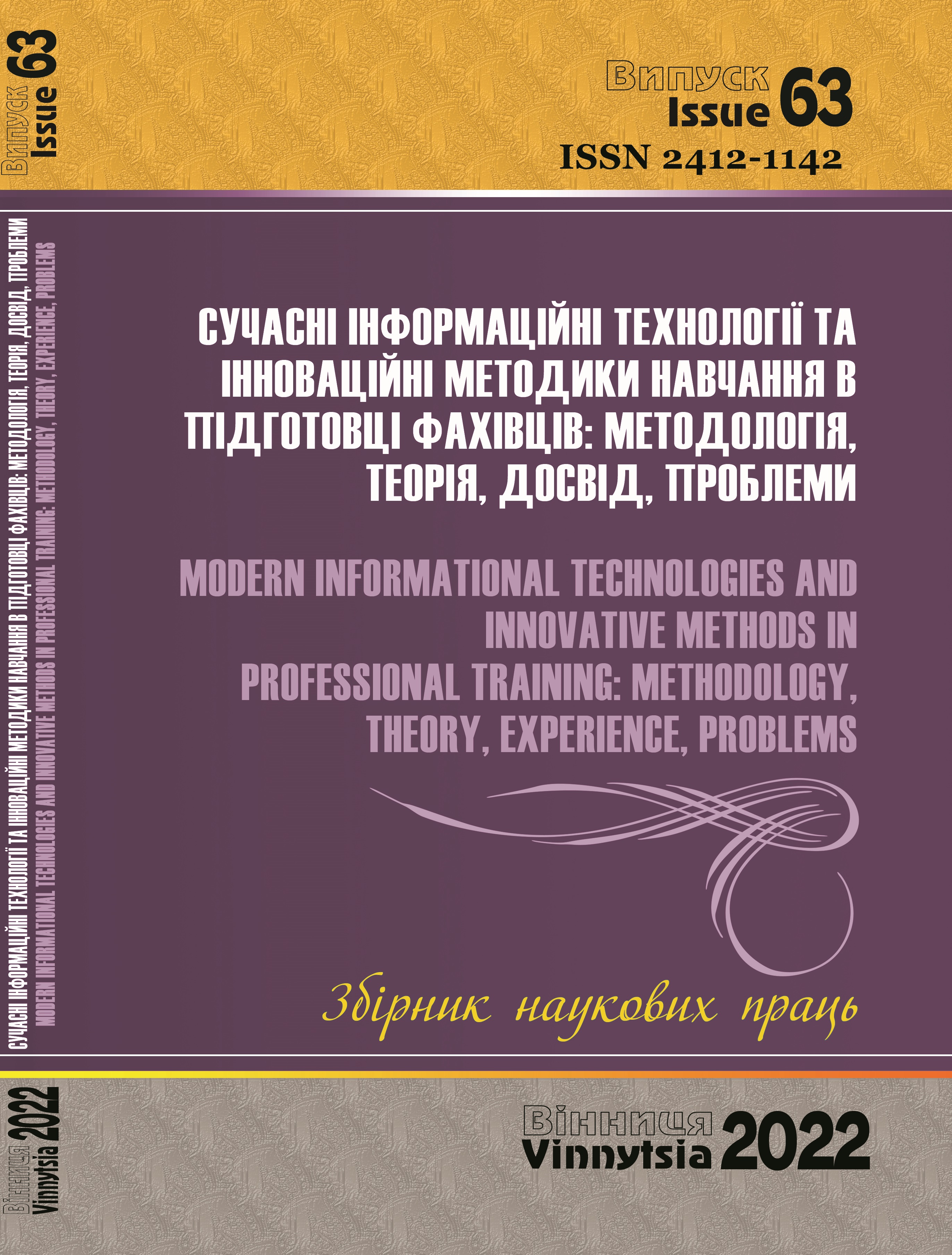ОБҐРУНТУВАННЯ ОРГАНІЗАЦІЙНО-ПЕДАГОГІЧНИХ УМОВ ЗДІЙСНЕННЯ НАДЗВИЧАЙНОГО ВІДДАЛЕНОГО НАВЧАННЯ У ЗАКЛАДАХ ВИЩОЇ ОСВІТИ
DOI:
https://doi.org/10.31652/2412-1142-2022-63-96-106Ключові слова:
заклад вищої освіти, дистанційна освіта, онлайн-навчання, надзвичайне віддалене навчання, організаційно-педагогічні умови віддаленого навчання.Анотація
Статтю присвячено аналізу потенціалу надзвичайного віддаленого навчання студентів.
Акцентовано увагу на відмінностях такого типу дистанційної освіти від онлайн-освіти.
Опрацьовано з урахуванням останніх публікацій вітчизняний досвід впровадження дистанційної
освіти у закладах вищої освіти і з’ясовано причини неготовності вітчизняних закладів вищої освіти
до переходу на дистанційний режим надзвичайного віддаленого навчання. Наголошено, що
більшість дослідників визначає позитивні сторони примусової дистанційної освіти, серед яких
насамперед можливість використання змішаного навчання як оптимального формату у ситуації
надзвичайності.
За допомогою онлайн-опитування викладачів і студентів Донецького національного університету
імені Василя Стуса визначено переваги і труднощі переходу у режим віддаленого навчання.
Доведено, що технічними труднощами є проблеми з вимкненням електрики і проблеми із
Інтернетом тощо. З’ясовано, що психологічним недоліком віддаленого навчання стало надмірне
навантаження, що спричинило погіршення зору, фізичну втому і духовне обмеження. Окрім того,
для багатьох виявилося проблемно спілкуватися із вимкненою камерою і мікрофоном. Виявлено
дидактичні труднощі віддаленого навчання – це ідентифікація самостійності виконання студентами
тестових завдань і необхідність створення нових матеріалів, пошук нових педагогічних прийомів
для активізації навчальної діяльності у віддаленому режимі. Наголошено, що недоліком
організаційно-управлінського характеру опитані респонденти назвали відсутність посильної
допомоги від керівництва з питань навчання у віддаленому режимі і велику кількість звітної
документації.
Визначено переваги надзвичайного віддаленого навчання – це можливість працювати віддалено,
мобільність і зручність, прозорість системи оцінювання, використання хмарних технологій.
Констатовано, що найзручнішим комунікатором для проведення онлайн-занять є Microsoft Teams.
Зважаючи на опитування, у 67,4% студентів не виникало особливих проблем із засвоєнням нових
знань, умінь та навичок при переході на навчання у віддаленому режимі.
Уточнено визначення «організаційно-педагогічні умови здійснення віддаленого навчання у ЗВО».
Обґрунтовано психолого-педагогічні (суб’єктивні) і організаційно-управлінські (об’єктивні) умови
здійснення надзвичайного віддаленого навчання у закладах вищої освіти.
Завантажити
Посилання
Стукало Н. Надзвичайне віддалене навчання vs онлайн освіта. Національне агентство із забезпечення
якості вищої освіти. URL: https://naqa.gov.ua/2020/10/ (дата звернення 21.10.21).
Статівка О. О. Проблеми вивчення іноземних мов в умовах дистанційної освіти студентів ЗВО зі
специфічними умовами навчання. Інноваційна педагогіка. 2021. Вип. 37. С.116-120.
Косюк В. Р. Зміст та принципи організації дистанційного навчання в закладах вищої освіти. Інноваційна
педагогіка. 2021. Вип. 37. С. 218-223.
Подоляк І. В. Упровадження дистанційної освіти під час вивчення дисциплін «Неврологія» і «Психіатрія
та наркологія» у Волинському медичному інституті. Інноваційна педагогіка. 2021. С. 256-261.
Федорів М. Б., Джус О. В., Симчич А. В. Оцінка якості навчання студентів-медиків в умовах дистанційного
навчання. Інноваційна педагогіка. 2021. Вип. 37. С. 375-378.
Корнієнко Є. Г., Грицина В. П., Гордєєва О. В., Корнієнко В. І. Аналіз досвіду дистанційного навчання в
умовах карантину та пошук вирішення проблем. Інноваційна педагогіка. 2021. Вип. 37. С. 34-38.
Добровольська Н. В., Бондар М. Б. Обґрунтування організаційно-педагогічних умов застосування
дистанційного навчання при підготовці фахівців з економічної кібернетики. Дистанційне навчання як
сучасна освітня технологія: матер. міжвуз. вебінару (м. Вінниця, 31 березня 2017 р.) від. ред.
Л. Б. Ліщинська. Вінниця: ВТЕІ КНТЕУ, 2017. С. 83-85.
Гавриленко К. Організаційні етапи створення дистанційного курсу. Екстрене дистанційне навчання в
Україні: монографія / за ред. В. надзвичайних умовах М. Кухаренка, В. В. Бондаренка. Харків: Вид-во КП
«Міська друкарня», 2020. С. 128–142.
Долгальова О. В., Єщенко М. Г., Пучков І. Р. Використання хмарних технологій під час карантину.
Екстрене дистанційне навчання в Україні: монографія / за ред. В. М. Кухаренка, В. В. Бондаренка. Харків:
Вид-во КП «Міська друкарня», 2020. C. 197–205.
Завантаження
Опубліковано
Номер
Розділ
Ліцензія
Авторське право (c) 2022 Інна Зарішняк, Марія Грабович

Ця робота ліцензується відповідно до ліцензії Creative Commons Attribution 4.0 International License.





